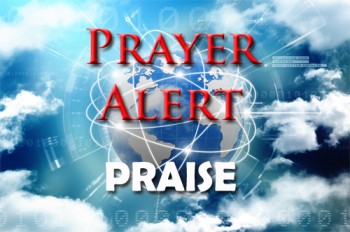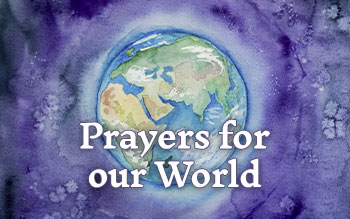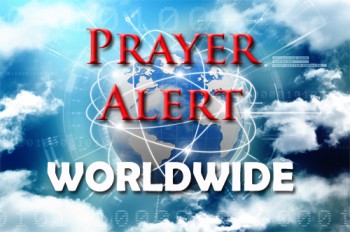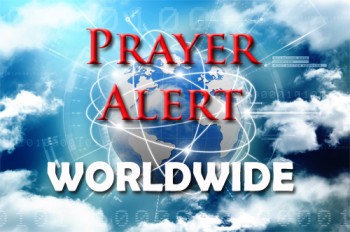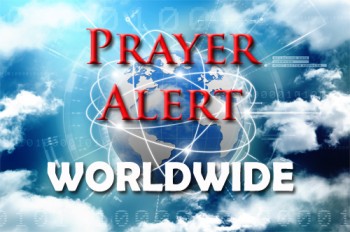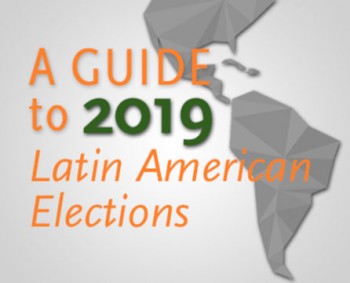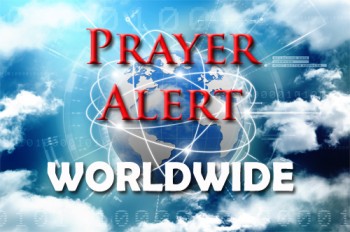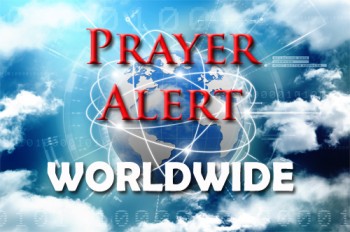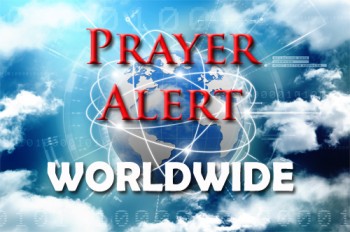Displaying items by tag: Latin America
Mexico: from murder to mercy
23 people died following cartel gun battles in a town near the US border. Mexico’s murder rate is up 2% this year, but God’s Spirit is moving. Recent evangelistic meetings in Sonora attracted 1,500+ people, 100 became Christians, and 75,000+ Spanish Bibles and Christian resources were distributed. As a leader walked to his car after an event, a man approached him saying, ‘I was behind the stage drinking Heinekens, and I heard you talking at the evangelistic meeting. I spent 10 years in Pelican Bay because I killed two people. I don’t know why I do bad when I want to do right.’ The man sobbed and was given a comforting embrace. ‘Then I led him in the plan of salvation. He gave his life to the Lord Jesus Christ. We gave him a free Bible and got him introduced to a local pastor.’
Latin America: Cold War 2.0?
Many geopolitical media watchers and prayer warriors believe the growing wave of anti-government protests ravaging the streets of Ecuador, Chile, Bolivia and Colombia hasn’t been seen since the old Cold War which is why the increase in protests and tensions might be called Cold War 2.0 in Latin America.
This time, at least as yet, there aren’t armed proxy groups in play but Moscow has weaponized social unrest to sabotage Western power in the region.
Earlier this decade we saw similar issues on Russia’s strategic periphery, notably in Ukraine in the wake of the 2014 Maidan protests and the 2005 Orange Revolution. These protests aren’t necessarily armed Marxists but anti-government protesters armed with anti-U.S. rhetoric.
Much the same approach is evident in Moscow’s support for Nicholas Maduro’s failing regime in Venezuela and with the help of Cuban operatives. Russia has become increasingly adept at using social media to disperse disinformation on the Internet.
Pray: for God to prevent cold wars through economic trade, cyber or arms race. (Psalm 2: 1,2a,4)
Pray: for peaceful and democratic routes to be brokered for the unrest in these Latin American countries.
Pray: that super-powers stop interfering with these vulnerable countries for their own gain.
Pray: for the Christian Church in Latin America, that it will continue to flourish and grow despite the economic and political tensions.
Latin America: a new Cold War?
Many geopolitical media watchers and prayer warriors believe the growing wave of anti-government protests ravaging the streets of Ecuador, Chile, Bolivia and Colombia hasn’t been seen since the old Cold War, which is why the increase in protests and tensions might be called Cold War 2.0 in Latin America. This time, at least as yet, there aren’t armed proxy groups in play but Moscow has weaponised social unrest to sabotage Western power in the region. Earlier this decade we saw similar issues on Russia’s strategic periphery, notably in Ukraine in the wake of the 2014 Maidan protests and the 2005 Orange Revolution. These protesters aren’t necessarily armed Marxists, but anti-government and armed with anti-US rhetoric. Much the same approach is evident in Moscow’s support for Nicholas Maduro’s failing regime in Venezuela, with the help of Cuban operatives. Russia has become increasingly adept at using social media to disperse disinformation on the Internet.
Chile: inequality triggers protests
For decades political leaders have promised that free markets would lead to prosperity, which would take care of other problems. The promises came to nothing, and thousands of protesters are chanting, ‘Chile, wake up’. The middle class struggles with high prices, low wages, a privatised retirement system, and the elderly in bitter poverty. A series of corruption and tax-evasion scandals eroded faith in the political and corporate elite. While protests began peacefully over three weeks ago, now there are images of metro stations destroyed, supermarkets looted, and flaming street barricades. There are accusations of torture and abuse by the 200,000 security forces, who have used tear gas and water cannon to disperse demonstrators. Social media is reporting many deaths. The UN is investigating human rights abuses. Two centuries after independence from Spain, the Catholic Christian faith of the conquistadors remains the largest in Chile today. Pray for the Church’s voice of peace and justice to be heard.
USA / Mexico: stranded Africans
It is reported that 4,799 Africans were apprehended in Mexico between January and July, a fourfold increase over the same period in 2018. Between 1,500 and 3,000 Africans are currently camping in tents outside the Mexican city of Tapachula. They have been there for months after fleeing conflict-ridden countries like Cameroon and DR Congo. Most flew to Brazil, then made the dangerous journey north through road-less swathes of jungle into Mexico, hoping finally to reach the USA to claim asylum. They can’t leave Tapachula without a permit, but these are scarce since Mexico agreed to help President Trump to limit numbers crossing the border. Now Trump intends to bar people from applying for asylum if they haven’t first applied in the countries they crossed - Honduras, El Salvador, and Guatemala. Migrants could be deported back to ‘safe third countries’, which are not safe and would put many at renewed risk.
Latin American Elections – Oct 2019
A briefing on the forthcoming Latin American elections by Yanira Gonzalez - IPC's Regional Representative and Leadership Team member
We really need God’s intervention in the next presidential elections in Latin America. We are facing the DECEPTION of the enemy that makes us pray for our nations not according to God’s perfect will, but according to the manipulation of the media, our bias and agendas.
Please pray for gubernatorial elections that will affect 3 strategic countries:
- Argentina general election - 27 October 2019
- Bolivia general election - 20 October 2019
- Uruguaya general election - 27 October 2019
Like the rest of the Continent, Latin America 2019 presidential elections presents two visions: Conservatism or progressivism & socialism; biblical faithfulness or political correctness. We definitely need to 'Watch and pray'!
The Bible, in Timothy 2:2 commands us "to pray for those who govern and for all authorities." An act of reflection and responsibility. This role has changed in the last 20 years in Latin America, where Christians have formed and strengthened political movements capable of obtaining legislative seats, influencing presidential elections and transferring the debate from ideas to beliefs. Four of the last election campaigns in the region have been under the influence of Christian parties. The candidates supported by these parties won the first round in Brazil (Jair Bolsonaro), Colombia (Iván Duque) and Mexico (Andrés Manuel López Obrador).
Prayer points in regards to the presidential elections of these 3 countries & Latin America:
- That our nations in Latin America would turn back to God. May God help us. We need him desperately to renew our hope and restore our land. We need his forgiveness and healing. May His Spirit sweep across our nations and draw many out of darkness. May believers everywhere draw close to Him and seek his face like never before. “Blessed is the nation whose God is the Lord…” Ps. 33:12
- That Latin America would be faithful in praying for leaders and those in authority, knowing that their decisions directly affect us too. May God give them wisdom and courage as they lead our nations. May He give them a desire to listen for his voice and follow his ways. May God in His mercy, appoint principled, godly men and women into positions of authority in our nations. “When the righteous thrive, the people rejoice; when the wicked rule, the people groan.” Prov. 29:2
- That Latin America would recognize God’s Sovereignty over all. His word reminds us that He is the One who ultimately has the power to position all those in leadership, and to remove them. It is “God who changes the times and seasons; He sets up kings and deposes them. He gives wisdom to the wise and knowledge to the discerning.” Dan. 2:21 “But the plans of the Lord stand firm forever, the purposes of his heart through all generations.” Ps. 33:11
- That Latin America would recognize the real battle is not fought against what is seen, but what is unseen. The real enemy is not a person or political party, but is Satan himself, and his dark forces that oppose God and fight against Truth. “For our struggle is not against flesh and blood, but against the rulers, against the authorities, against the powers of this dark world and against the spiritual forces of evil in the heavenly realms.” Eph. 6:12 “For the weapons of our warfare are not of the flesh but have divine power to destroy strongholds.” 2 Cor. 10:4
- That Latin America would not succumb to worry, fear, or defeat. That we wouldn’t grow so weary that we just give up, and tune out...God is the One who sets free and has the power to restore our nations.
"They will have no fear of bad news; their hearts are steadfast, trusting in the Lord." Ps. 112:7 "Do not be anxious about anything, but in every situation, by prayer and petition, with thanksgiving, present your requests to God. And the peace of God, which transcends all understanding, will guard your hearts and your minds in Christ Jesus." Phil. 4:6-7
- That Latin America would pray for those in authority who are unjustly attacked and accused. That God’s protection would cover His people, that He would surround them with favor as a shield. “No weapon that is formed against you will prosper; and every tongue that accuses you in judgment you will condemn…” Is. 54:17
- That Latin America’s hope would remain in the Lord. That we would recognize His great Power. That we would trust Him and believe that He is Able, and nothing is impossible with Him. “Look at the nations and watch-- and be utterly amazed. For I am going to do something in your days that you would not believe, even if you were told.” Hab. 1:5
Yanira Gonzalez - IPC Latin America Representative / Leadership Team
More at: www.clamor.global
Latin America / Caribbean: corruption
Bribery, vote-buying and sexual extortion are major issues of concern for citizens in Latin America and the Caribbean; a survey asked over 17,000 citizens from 18 countries about their experiences of bribery and perceptions of corruption. The survey sheds light on sexual extortion, or sextortion, one of the most gruesome gendered impacts of corruption. One in five people have experienced sextortion or know someone who has while accessing basic public services in Latin America and the Caribbean and one in four are offered bribes in exchange for votes, which highlights an alarming lack of political integrity among governments across the region. The good news is that an overwhelming majority of people are optimistic that they can make a difference in the fight against corruption. Now, more than ever, leaders urgently need to fight corruption and strengthen democracy. Pray for God to comfort those abused, give peace to those living in fear, and help NGOs and governments as they fight corruption in its various forms.
Mexico: pastor killed during church service
Pastor Cruz Canseco was in the pulpit of his church when he was shot at point-blank range. His attacker was prevented from escaping, and was subsequently handed over to the authorities. The pastor died on the way to hospital. His murder follows a series of attacks targeting religious leaders, including the kidnapping of Pastor Méndez Ruiz, who had prevented Cuban migrants from being abducted from a shelter on 3 August. The expansion of violent criminal groups and the pervading climate of impunity surrounding such crimes has led to increased violence against religious leaders. Criminals view church leaders as a threat to their power, so they are threatened, kidnapped and killed. Lack of proper investigation means perpetrators are not brought to justice. Pray for the family and congregation of Pastor Cruz Canseco and for the wellbeing and return of Pastor Ruiz .
Mexico: children sold at US border
Women in Tijuana shelters fear their children will be kidnapped after seeing groups of men approaching mothers and offering to purchase their children to expedite their asylum process. When children are accompanied by adults crossing the border, current US law stipulates that they are held in custody temporarily, then released with parents or guardians with whom they arrived while they wait for their asylum cases to be processed. Authorities are investigating claims of women being asked to sell their children for $350 (£280) each. Border authorities are aware that migrants crossing the border are using children that are not related to in order to more easily enter the U.S. Tijuana, known for its nightlife and shopping, is in Baja California State, and has no way of keeping track of migrant children, according to the pastor of Agape Mission shelter in south Tijuana.
Brazil: indigenous people under attack
The 1988 Brazilian constitution recognises indigenous peoples' right to pursue traditional ways of life and the permanent, exclusive possession of their ‘traditional lands’, demarcated as Indigenous Territories. When Jair Bolsonaro became president on 1 January, he vowed that not another centimetre of indigenous land would be protected under his leadership, and he would forcibly ‘integrate’ them, adding it was ‘a shame that the Brazilian cavalry wasn’t as efficient as the Americans, who exterminated the Indians’. Indigenous peoples are fearful. His administration has launched an unprecedented attack on them, with the explicit aim of destroying their way of life and plundering their land. On 28 June 2,000+ people occupied the capital holding banners and arrows, marching to the ministry of health and the ministry of justice. Pray for the restoration of healthcare access to indigenous people; and that they will have more land rights and access to public services. See
